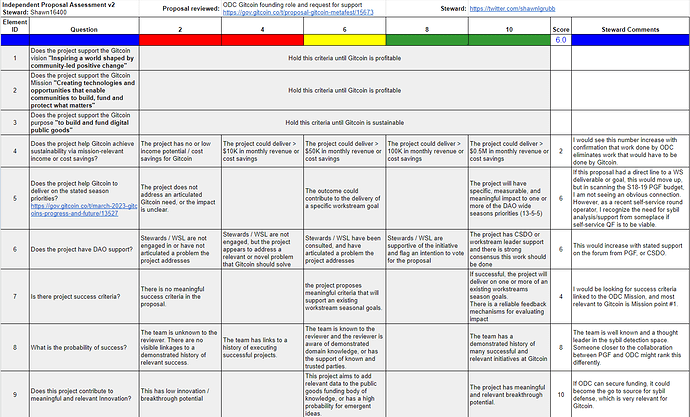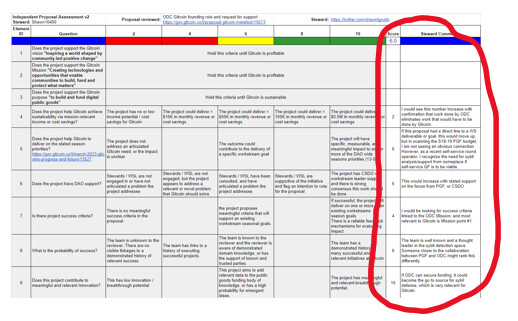Title: [GCP-00x] - Gitcoin OpenData Community Founding Partnership
Author(s): Evan Powell with many reviewers
Version 1.0: June 27, 2023
Summary:
This proposal seeks a commitment of $65,000 from the Gitcoin Treasury to support the OpenData Community (ODC), a non-commercial DAO dedicated to protecting public goods funding and supporting decentralization at the data layer. The funding will help the OpenData Community to improve its ability to deliver complementary open-source and free-to-use software, algorithms, analysis, data sets, and data scientists for users of Gitcoin protocols. Gitcoin in turn will receive, when available, erc-20 locked tokens for use in governance as a Founding Sponsor of the ODC.
The complementary goods provided by the ODC are important for Gitcoin users including round operators. As an open-source project, the ODC is capable of delivering them less expensively than other approaches. Recently members of the ODC have been active in reviewing the Beta Round, the Citizens Retroactive Funding Round, and the DeSci Round at no charge to any of the round operators.
Introduction:
The OpenData Community (ODC) emerged in late 2022 from Gitcoin FDD, with a mission to leverage data science and software development expertise to protect public goods funding through Sybil analysis and squelching. This proposal outlines our plan for sustainability and the benefits that Gitcoin, as a Founding Sponsor, would gain from supporting our mission.
OpenData Community:
The ODC’s mission is twofold:
- Defending Web3 from Sybil attacks and other types of Fraud: We aim to protect public goods funding, airdrops, DAO governance, fair and transparent markets, and other public squares from Sybil and similar attacks.
- Preventing centralization at the data layer: We strive to protect the decentralization and resistance to censorship of Ethereum and other well-designed blockchains by supporting decentralized approaches to data access and analysis.
To achieve these goals, the ODC hosts quarterly hackathons, develops open-source software projects, and curates useful data sets and decentralized data infrastructure for the broader community. We also help to recruit and train data analysts and data scientists.
Governance and the Role of a Founding Partner such as Gitcoin:
As a Founding Partner and member of our inaugural Steward Council, Gitcoin will receive a leading position in the governance of the OpenData Community and will be in a position to participate in a growth in the value of the OpenData Community.
The governance tokens that Gitcoin receives will be locked for a period of not less than one year, with the option of the DAO voting to unlock tokens after that period.
In addition, the OpenData Community is implementing on-chain governance via the use of the Hats Protocol as outlined in our forums in a discussion entitled People Pipelines. These are ERC-1150-based tokens and are used to establish roles - and hence accountability.
Use of Proceeds:
The funding will be used to execute a plan that will result in the sustainability of the OpenData Community by enabling us to secure additional support while improving the depth and quality of our capabilities. The budget breakdown is as follows:
- 1.5 full-time equivalent staff: $7,500 per month
- Ongoing bounties: $2,500 per month
- Legal expenses: $2,500 per month
- Total: $12,500 per month
While it is difficult to be certain during a bear market, there are a number of DAOs making grants and other stakeholders that have expressed interest in similarly supporting the OpenData Community.
Benefits to Gitcoin:
By supporting the OpenData Community, which provides complementary software, data sets, analysis, algorithms and experienced data scientists and developers that Gitcoin users can use in running their grants rounds and other activities with the aid of Gitcoin protocols, Gitcoin stands to gain:
- Increased market for the Allo protocol and Gitcoin-enabled public goods funding
- Increased market for Gitcoin Passport
- Additional relationships with a diverse set of web3 stakeholders
Many would-be users of the Allo protocol and related software such as Grants Stack and Gitcoin Passport are in need of credible data analysis and related software. For example:
- Automation: Automation of aspects of Grants review and Sybil squelching
- Reporting: Dashboards for Grants review and grants funding allocations including the impact of Sybils; these reports increased credibility and trust
- Customization: For example, whether a given community should use default Gitcoin Passport thresholds
- Screening of known Sybils: For example, the recent ODC Hackathon revealed that Sybils that had been identified in another community were present in the Gitcoin Beta Round
- Turn-key services: As a non-commercial organization, the OpenData Community does NOT provide turn-key services however members of the ODC work with professional services organizations to deliver services as needed
In addition, the transparency provided by the ODC can be useful in building the credibility of allocation decisions; as discussed recently in collaboration with Gitcoin teams, whereas Gitcoin and other round operators as they emerge must make the ultimate call on which potential Sybils and Grants are allowed, the ODC can play an important role both as a provider of important complements, including data sets, data scientists, algorithms and software and also as a check and balance that can be used by the community to validate results.
Potential Risks:
While we are confident in our mission and strategy, we acknowledge the following potential risks:
- Gitcoin dependency: We need to continue to demonstrate value to non-Gitcoin supporters to broaden our support and achieve our mission. We believe this grant and the role of Gitcoin as a Founding Partner will help to catalyze similar relationships with a number of other stakeholders.
- Competitive responses: It may be the case that individuals within a particular round operator or within proprietary providers of analysis and data services would feel threatened by the OpenData Community. Over time we expect the positioning of the ODC as a non-commercial provider of Research and Development, tooling, skilled analysts, and data sets will be more clear and less likely to elicit a competitive response.
- Public good dependency: Thus far our algorithms, software, and members have applied themselves primarily to protecting public goods funding; while we are planning to collaborate with leading marketplaces and others such as investors concerned about wash trading, we have focused our first three hackathons on the public goods ecosystem.
- Lack of governance decentralization: We need to put our on-chain governance into production to enable us to grow and allocate our scarce resources credibly and in a way that resists capture. This is a primary outcome of this funding.
- Dependency on key volunteers: A limited number of individuals are dedicating substantial time and may be unable to continue to do so if the ODC does not receive funding or for other reasons.
- Lack of coordination across web3: Systemic barriers to effective cross-project coordination could hamper our efforts to protect web3. We are often overlooked by projects clearly in need of our capabilities; again, becoming more sustainable will presumably help here.
- Lack of regulatory clarity or good faith: Regulatory uncertainties could impact our operations.
KPIs:
Our key performance indicators include:
- Initial governance on-chain launch by August 15th via the Hats Protocol
- Receipt of additional funding and contributions, including additional Founding Sponsors and Steward Council members by September 30th
- Hosting quarterly hackathons with continued growth in participation including sponsors who assist in designing the Hackathons
Thank you for reading this proposal and for your support and feedback.
Vote:
Yes: Support the OpenData Community with $65,000 in funding.
No: Do not support the OpenDataCommunity in this way.
Abstain: I am missing context or this proposal needs more refinement.
Resources:
- OpenData Community website: www.opendatacommunity.org
- OpenData Community Regen Rangers hackathon: https://app.buidlbox.io/opendata/regen-rangers-hack
- OpenData Community Forum: forum.opendatacommunity.org
- OpenData Data Portal (beta): https://data.opendatacommunity.org/
- OpenData on Ocean Protocol including access controls on curated lists of Sybils: odc.oceanprotocol.com
- Working with the OpenData Community (forum post): A (draft) guide for engaging with the OpenData Community - #3 by epowell101 - General - OpenData Community, home of the Regen Rangers
- OpenData Community remains non-commercial (forum post): OpenData Community will NOT be a commercial enterprise & other thoughts on revenue models - General - OpenData Community, home of the Regen Rangers

